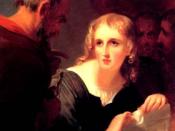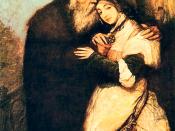Shakespeare uses similar comic elements to effect
similar outcomes in his works. Many of his plays
utilize trickery and disguise to accomplish similar
endings.
Trickery plays a major role in The Merchant of
Venice and drives most of the action, while mistaken
identity, specifically Portia's disguise as the
'learned attorney's' representative, plays a major
role in the resolution of the play. The first
instance of trickery in the play is Bassanio's plan to
present himself as a financially sound suitor, when in
truth, he is not.
Bassanio believes that he would stand a very good
chance of being the successful suitor if he had the
proper money backing him. Bassanio then goes to his
friend Antonio to try to secure a loan to provide for
his wooing.
O my Antonio, had I but the means/To hold a rival
place with one of them [other suitors]/I have a
mind presages me such thrift/That I should
questionless be fortunate!' (Shakespeare,
Merchant 1.1
173-176)
However, Antonio has, 'neither the money, nor
commodity/to raise a present sum' but urges Bassanio
to go through Venice to try to secure a loan using
Antonio's bond as credit (Shakespeare, Merchant 1.1
178-179).
One of the resident money-lenders of Venice is an
individual called Shylock, a person of Jewish descent.
The practice of usury was traditionally banned by the
Christian church. This allowed many Jews, because
their belief system contained no objection to
profitable money-lending, to become the de facto loan
officers. Bassanio approaches Shylock to ask for a
loan, and Shylock seems as if he is going to agree,
however, he first asks to speak with Antonio. It is
revealed in an aside that Shylock harbors a secret
hatred of Antonio because of his religion and
Shylock's belief that Antonio's practices drive down
the interest...


